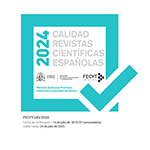COVID-19, homelessness and institutional response Reflections from the city of Alicante (Spain)
Abstract
The measures adopted in the face of the COVID-19 pandemic, especially those referring to the social distancing and home isolation of the population, made homeless people one of the focal points of the emergency health measures and of the forces of public order. This paper analyses the different institutional responses through a review of the scientific literature on the pandemic and homelessness in different cities. It discusses whether, in the context of the health emergency, there has been a shift towards policies of confinement and control of homelessness or, as some papers argue, the pandemic has revealed that the goal of "eradicating homelessness" is possible if there is sufficient political will to do so. The case of the city of Alicante and the care provided to homeless people during the health crisis is analysed. The findings describe a scenario of regression towards forms of containment and management of homelessness that are a clear departure from the housing-centred responses that appeared to be in place in the city in the years prior to the pandemic.
Downloads
Article download
License
In order to support the global exchange of knowledge, the journal Cuadernos de Trabajo Social is allowing unrestricted access to its content as from its publication in this electronic edition, and as such it is an open-access journal. The originals published in this journal are the property of the Complutense University of Madrid and any reproduction thereof in full or in part must cite the source. All content is distributed under a Creative Commons Attribution 4.0 use and distribution licence (CC BY 4.0). This circumstance must be expressly stated in these terms where necessary. You can view the summary and the complete legal text of the licence.









